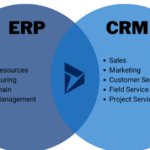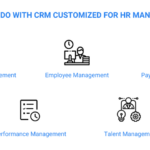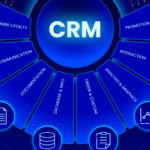Customer relationships are the foundation of any successful business, but in previous decades, the process of managing and tracking customer relationships within a company was fragmented and time-consuming at best. Physical customer data would be kept in filing cabinets and spreadsheets.
These methods of customer-data storage not only required a lot of manual labor, but they also meant that the data wasn’t properly distributed throughout the company (for example, between sales and marketing departments), which often resulted in missed business opportunities.
CRM for business development lets marketers and salespeople manage and analyze relationships with actual and potential customers of the company at the most basic level. It keeps track of all interactions with the company and collects customer data. When a marketer speaks with a customer, the marketer is always aware of their identity and previous interactions with the company. This personalizes the interaction, increases the chances of conversion, and fosters customer trust and loyalty. Certain processes are handled by CRM software, which can automate repetitive tasks for marketers, set reminders for important events, and display alerts if something requires attention. Some CRMs also have analytics features that allow you to track the effectiveness of various marketing campaigns for lead generation and conversions. Sales and marketing teams can use CRM software combined with marketing automation to manage all aspects of the sales and marketing funnel, from lead qualification to forecasting and deal closing. Marketing automation (the top funnel) and customer relationship management (bottom-funnel) capabilities are combined in end-to-end sales funnel management.
The following is a list of features that our CRM platform typically provides:
Lead management: The best CRM software keeps track of a company’s leads, allowing marketing teams to manually or automatically enter new leads into the system, as well as track and analyze data about them.
Marketing automation: The system can send marketing emails to customers at times set by the marketer, or publish social media posts on a schedule. The goal of marketing automation is to keep sales leads engaged and convert them into paying customers.
Sales automation: CRMs can track customer interactions and automate certain sales cycle business functions that are required to follow up on leads and attract and retain new customers.
Automation of workflows: CRM systems help businesses optimize processes by streamlining mundane workloads that allow employees to focus on creative and higher-level tasks.
Analytics: CRM solutions can include integrated analytics tools that provide insights and help boost customer satisfaction rates. A marketer can examine the data and create targeted campaigns as a result.
Individualized customer experiences: A CRM can also be used to create customized and consistent experiences for your potential customers across various marketing channels, potentially increasing conversions and brand awareness.
You can expect your organization to be ready to grow by closely reflecting its processes and seamlessly integrating with existing systems if you use good CRM software.






0 Comments